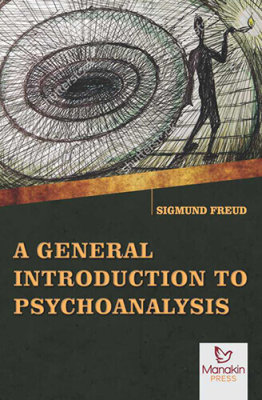A General Introduction to Psychoanalysis
₹695.00
Sigmund Freud | Category: Social ScienceBook Details
ISBN: 9789386677303
YOP: 2018
Pages: 428
Order also on
Few, especially in this country, realize that while Freudian themes have rarely found a place on the programs of the American Psychological Association, they have attracted great and growing attention and found frequent elaboration by students of literature, history, biography, sociology, morals and aesthetics, anthropology, education, and religion. They have given the world a new conception of both infancy and adolescence, and shed much new light upon characterology; given us a new and clearer view of sleep, dreams, reveries, and revealed hitherto unknown mental mechanisms common to normal and pathological states and processes, showing that the law of causation extends to the most incoherent acts and even verbigerations in insanity; gone far to clear up the terra incognita of hysteria; taught us to recognize morbid symptoms, often neurotic and psychotic in their germ; revealed the operations of the primitive mind so overlaid and repressed that we had almost lost sight of them; fashioned and used the key of symbolism to unlock many mysticisms of the past; and in addition to all this, affected thousands of cures, established a new prophylaxis, and suggested new tests for character, disposition, and ability, in all combining the practical and theoretic to a degree salutary as it is rare.
These twenty-eight lectures to laymen are elementary and almost conversational. Freud sets forth with a frankness almost startling the difficulties and limitations of psychoanalysis, and also describes its main methods and results as only a master and originator of a new school of thought can do. These discourses are at the same time simple and almost confidential, and they trace and sum up the results of thirty years of devoted and painstaking research. While they are not at all controversial, we incidentally see in a clearer light the distinctions between the master and some of his distinguished pupils. A text like this is the most opportune and will naturally more or less supersede all other introductions to the general subject of psychoanalysis. It presents the author in a new light, as an effective and successful.
Part I
THE PSYCHOLOGY OF ERRORS
FIRST LECTURE INTRODUCTION
SECOND LECTURE THE PSYCHOLOGY OF ERRORS
THIRD LECTURE THE PSYCHOLOGY OF ERRORS—(Continued)
FOURTH LECTURE THE PSYCHOLOGY OF ERRORS—(Conclusion)
Part II
THE DREAM
FIFTH LECTURE THE DREAM
SIXTH LECTURE THE DREAM
77 SEVENTH LECTURE THE DREAM
EIGHTH LECTURE THE DREAM
NINTH LECTURE THE DREAM
TENTH LECTURE THE DREAM
ELEVENTH LECTURE THE DREAM
TWELFTH LECTURE THE DREAM
THIRTEENTH LECTURE THE DREAM
FOURTEENTH LECTURE THE DREAM
FIFTEENTH LECTURE THE DREAM
Part III
GENERAL THEORY OF THE NEUROSES
SIXTEENTH LECTURE GENERAL THEORY OF THE NEUROSES
SEVENTEENTH LECTURE GENERAL THEORY OF THE NEUROSES
EIGHTEENTH LECTURE GENERAL THEORY OF THE NEUROSES
NINETEENTH LECTURE GENERAL THEORY OF THE NEUROSES
TWENTIETH LECTURE GENERAL THEORY OF THE NEUROSES
TWENTY-FIRST LECTURE GENERAL THEORY OF THE NEUROSES
TWENTY-SECOND LECTURE GENERAL THEORY OF THE NEUROSES
TWENTY-THIRD LECTURE GENERAL THEORY OF THE NEUROSES
TWENTY-FOURTH LECTURE GENERAL THEORY OF THE NEUROSES
TWENTY-FIFTH LECTURE GENERAL THEORY OF THE NEUROSES
TWENTY-SIXTH LECTURE GENERAL THEORY OF THE NEUROSES
TWENTY-SEVENTH LECTURE GENERAL THEORY OF THE NEUROSES
TWENTY-EIGHTH LECTURE GENERAL THEORY OF THE NEUROSES
Few, especially in this country, realize that while Freudian themes have rarely found a place on the programs of the American Psychological Association, they have attracted great and growing attention and found frequent elaboration by students of literature, history, biography, sociology, morals and aesthetics, anthropology, education, and religion. They have given the world a new conception of both infancy and adolescence, and shed much new light upon characterology; given us a new and clearer view of sleep, dreams, reveries, and revealed hitherto unknown mental mechanisms common to normal and pathological states and processes, showing that the law of causation extends to the most incoherent acts and even verbigerations in insanity; gone far to clear up the terra incognita of hysteria; taught us to recognize morbid symptoms, often neurotic and psychotic in their germ; revealed the operations of the primitive mind so overlaid and repressed that we had almost lost sight of them; fashioned and used the key of symbolism to unlock many mysticisms of the past; and in addition to all this, affected thousands of cures, established a new prophylaxis, and suggested new tests for character, disposition, and ability, in all combining the practical and theoretic to a degree salutary as it is rare.
These twenty-eight lectures to laymen are elementary and almost conversational. Freud sets forth with a frankness almost startling the difficulties and limitations of psychoanalysis, and also describes its main methods and results as only a master and originator of a new school of thought can do. These discourses are at the same time simple and almost confidential, and they trace and sum up the results of thirty years of devoted and painstaking research. While they are not at all controversial, we incidentally see in a clearer light the distinctions between the master and some of his distinguished pupils. A text like this is the most opportune and will naturally more or less supersede all other introductions to the general subject of psychoanalysis. It presents the author in a new light, as an effective and successful.
Part I
THE PSYCHOLOGY OF ERRORS
FIRST LECTURE INTRODUCTION
SECOND LECTURE THE PSYCHOLOGY OF ERRORS
THIRD LECTURE THE PSYCHOLOGY OF ERRORS—(Continued)
FOURTH LECTURE THE PSYCHOLOGY OF ERRORS—(Conclusion)
Part II
THE DREAM
FIFTH LECTURE THE DREAM
SIXTH LECTURE THE DREAM
77 SEVENTH LECTURE THE DREAM
EIGHTH LECTURE THE DREAM
NINTH LECTURE THE DREAM
TENTH LECTURE THE DREAM
ELEVENTH LECTURE THE DREAM
TWELFTH LECTURE THE DREAM
THIRTEENTH LECTURE THE DREAM
FOURTEENTH LECTURE THE DREAM
FIFTEENTH LECTURE THE DREAM
Part III
GENERAL THEORY OF THE NEUROSES
SIXTEENTH LECTURE GENERAL THEORY OF THE NEUROSES
SEVENTEENTH LECTURE GENERAL THEORY OF THE NEUROSES
EIGHTEENTH LECTURE GENERAL THEORY OF THE NEUROSES
NINETEENTH LECTURE GENERAL THEORY OF THE NEUROSES
TWENTIETH LECTURE GENERAL THEORY OF THE NEUROSES
TWENTY-FIRST LECTURE GENERAL THEORY OF THE NEUROSES
TWENTY-SECOND LECTURE GENERAL THEORY OF THE NEUROSES
TWENTY-THIRD LECTURE GENERAL THEORY OF THE NEUROSES
TWENTY-FOURTH LECTURE GENERAL THEORY OF THE NEUROSES
TWENTY-FIFTH LECTURE GENERAL THEORY OF THE NEUROSES
TWENTY-SIXTH LECTURE GENERAL THEORY OF THE NEUROSES
TWENTY-SEVENTH LECTURE GENERAL THEORY OF THE NEUROSES
TWENTY-EIGHTH LECTURE GENERAL THEORY OF THE NEUROSES
| Weight | 0.64 kg |
|---|---|
| Dimensions | 22.3 × 14.5 × 2.4 cm |
| yop |
2018 |
| subject-category |
Social Science |
| isbn |
9789386677303 |
Related products











